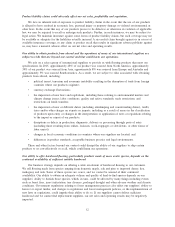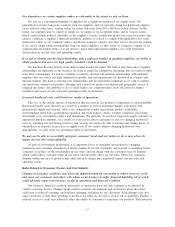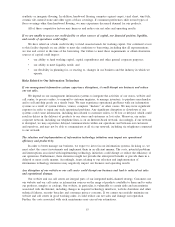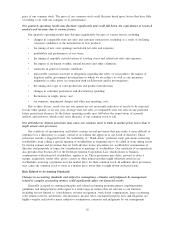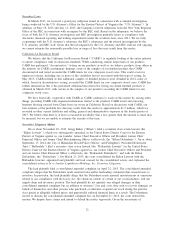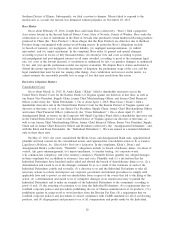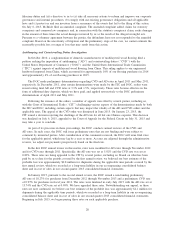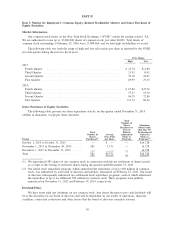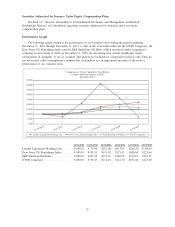Lumber Liquidators 2015 Annual Report Download - page 32
Download and view the complete annual report
Please find page 32 of the 2015 Lumber Liquidators annual report below. You can navigate through the pages in the report by either clicking on the pages listed below, or by using the keyword search tool below to find specific information within the annual report.litigation, the current status of the case, and the legal standards that must be met for, among other things,
class certification and success on the merits, we cannot estimate the reasonably possible loss or range of loss
that may result from this action.
NW Bamboo Matter
On February 27, 2014, NW Bamboo Trim, Inc. (‘‘NWBT’’) filed suit in the Circuit Court of the City of
Richmond, Virginia against us and a supplier of bamboo trim products (the ‘‘Supplier’’). In its complaint,
NWBT alleges that (i) we breached a contract with NWBT by not purchasing certain products from NWBT,
(ii) we tortiously interfered with NWBT’s relationship with the Supplier, and (iii) we and the Supplier
conspired to harm NWBT’s business. We filed a motion seeking to dismiss the claims, which was granted as
it pertained to the breach of contract claim. The case then proceeded on the two remaining causes of action.
On October 12, 2015, as part of its required discovery disclosures, NWBT identified a valuation of its
business of approximately $2.8 million as the basis for its compensatory damages claim. Subsequently, we
filed a motion for summary judgment seeking dismissal of NWBT’s case. On December 21, 2015, the Court
granted our motion for summary judgment and dismissed the two remaining causes of action in NWBT’s
complaint. On January 20, 2016, NWBT filed a notice of appeal in connection with the trial court’s dismissal
of NWBT’s case.
In light of the trial court’s ruling and our views regarding the merits of NWBT’s appeal, the likelihood of
a material loss in connection with this matter is now remote.
TCPA Matter
On or about March 4, 2014, Richard Wade Architects, P.C. (‘‘RWA’’) filed a lawsuit in the United States
District Court for the Northern District of Illinois (the ‘‘RWA Lawsuit’’), which was subsequently amended,
alleging that we violated the Telephone Consumer Protection Act (‘‘TCPA’’), the Illinois Consumer Fraud Act
and the common law by sending an unsolicited facsimile advertisement to RWA and a proposed class. RWA
sought recourse on its own behalf as well as other similarly situated parties who are members of the proposed
class that received unsolicited facsimile advertisements from us. The TCPA provides for recovery of actual
damages or five hundred dollars for each violation, whichever is greater. If it is determined that a defendant
acted willfully or knowingly in violating the TCPA, the amount of the award may be increased by up to three
times the amount provided above.
Although we believed we had valid defenses to the claims asserted, we entered into a settlement of the
claims in the RWA Lawsuit. On September 3, 2015, the Court entered an order granting final approval to the
settlement and certifying a settlement class. Under the settlement agreement, we paid a total of $0.3 million
including the plaintiffs’ attorneys’ fees, class notice and administration costs, a sum to RWA and cash
payments to members of the settlement class who file valid claims. The settlement amount was accrued in
2014 and was paid into an escrow fund on August 18, 2015. The settlement payment was released to class
counsel on October 16, 2015 after the final approval order became a final and non-appealable order.
Settlement payments to class members who submitted claims have now been issued by the claims
administrator, with a final accounting of the settlement fund to be filed with the court by March 4, 2016.
Prop 65 Matter
On or about July 23, 2014, Global Community Monitor and Sunshine Park LLC (together, the
‘‘Prop 65 Plaintiffs’’) filed a lawsuit, which was subsequently amended, in the Superior Court of the State of
California, County of Alameda, against us. In the amended complaint, the Prop 65 Plaintiffs allege that we
violated California’s Safe Drinking Water and Toxic Enforcement Act of 1986, Health and Safety Code
section 25249.5, et seq. (‘‘Proposition 65’’). In particular, the Prop 65 Plaintiffs allege that we failed to warn
consumers in California that certain of our products (collectively, the ‘‘Products’’) emit formaldehyde in
excess of the applicable safe harbor limits. The Prop 65 Plaintiffs did not quantify any alleged damages in
their amended complaint but, in addition to attorneys’ fees and costs, the Prop 65 Plaintiffs seek (i) equitable
relief involving the reformulation of the Products, additional warnings related to the Products, the issuance of
notices to certain of the purchasers of the Products (the ‘‘Customers’’) and the waiver of restocking fees for
Customers who return the Products and (ii) civil penalties in the amount of two thousand five hundred dollars
per day for each violation of Proposition 65.
22


